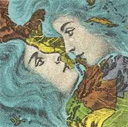0306 Gender and World’s Fairs at the Turn of the Twentieth Century
A Case Study in Panama and San Francisco
Identifiers (Article)
Abstract
This paper explores the intersections between gender, display, and empire at turn-of-the-century world’s fairs in the United States. The 1915 Panama-Pacific International Exposition serves as a case study. Designed to celebrate the completion of the Panama Canal, the 1915 fair was hinged on contemporary notions of manliness and used gender ideology to articulate prevailing ideas and assumptions about the American nation, its new empire, and its influence on the entire world. Indeed, gendered rhetoric found its way into numerous contemporary published tracts, articles, paintings, and popular culture that take on the enormity of the Panama Canal and its implications. Manliness and its mechanical prosthetic, technology, became the arenas through which the United States refashioned its national body and confidently assumed its new role as imperialist on the world stage.
Statistics


License

This work is licensed under a Creative Commons Attribution-NonCommercial-NoDerivatives 4.0 International License.



